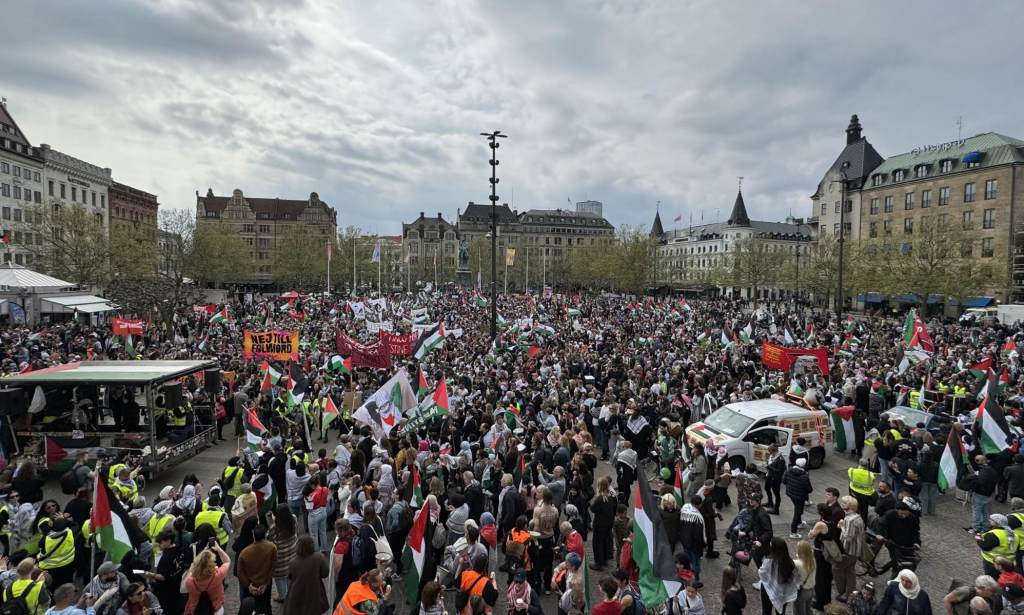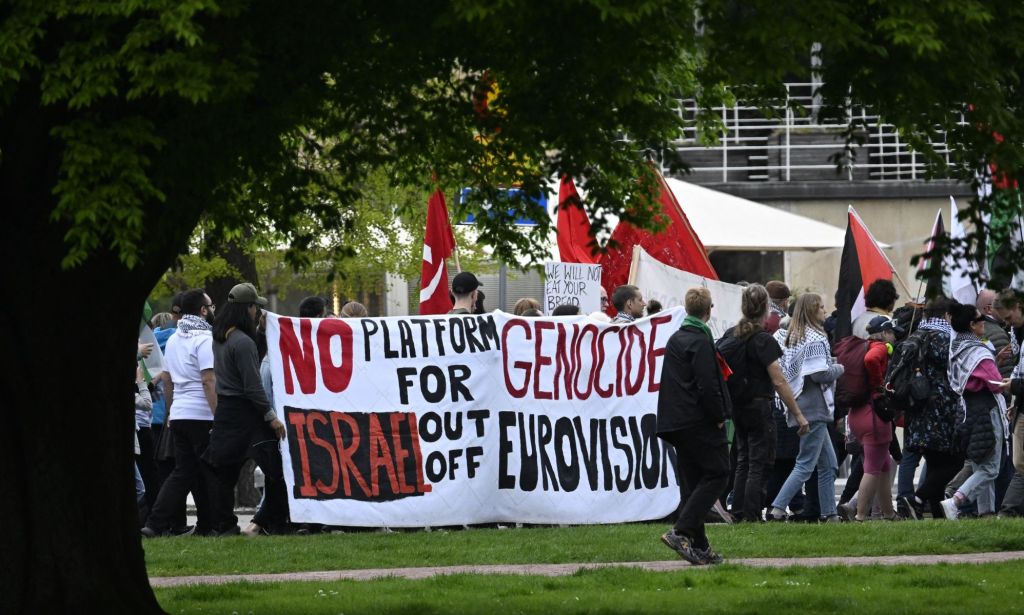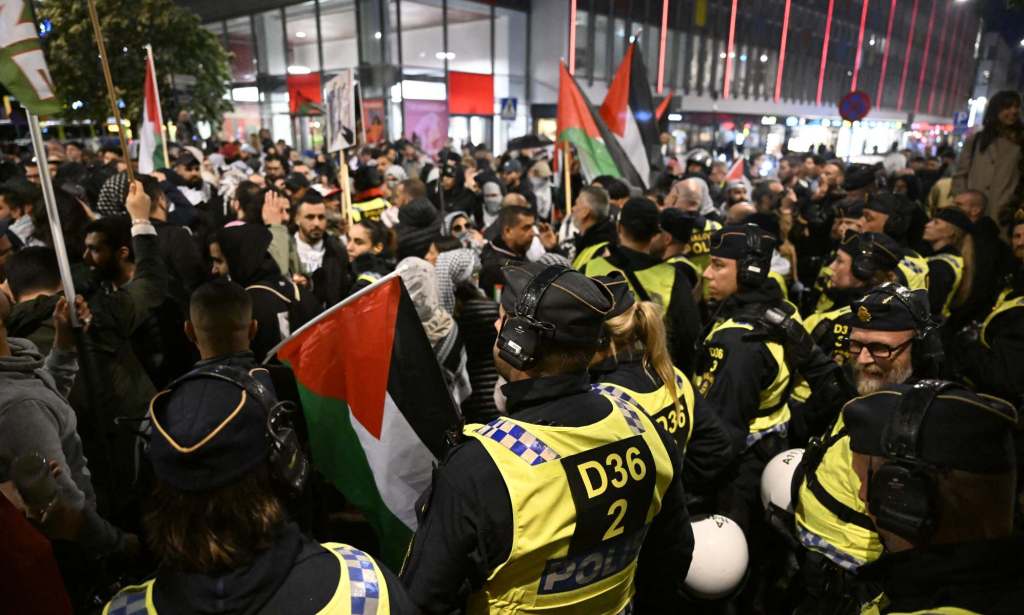Queer Eurovision fans on why they’ve chosen to boycott this year’s contest

Queer Eurovision fans boycotted the final amid the Israel-Hamas conflict. (JOHAN NILSSON/TT News Agency/AFP via Getty Images)
The Eurovision Song Contest has long boasted a passionate queer fanbase, but this year many queer people have decided to boycott the event over the participation of Israel, as the Hamas-Israel war rages on.
On Saturday (10 May), the 68th Eurovision Song Contest will be broadcast live from Malmö following Loreen’s 2023 win, with 37 countries battling it out to top the points table and earn the honour of hosting next year’s musical celebrations.
But the run-up to this year’s camp singing extravaganza has been steeped in controversy because of Israel’s participation, with pro-Palestine groups urging UK representative Olly Alexander and other contestants to withdraw, and protests taking place outside the Swedish venue.
The call comes in the wake of the attack on Israel by Hamas on 7 October, which led to the deaths of more than 1,200 people and triggered the ongoing war in Gaza. It is estimated that the conflict has already cost more than 35,000 Palestinians lives.
The disqualification of states involved in conflict is not without precedent: in 2022, Russia was banned from taking part in Eurovision after Vladimir Putin’s invasion of Ukraine.
Earlier this year, around 450 queer artists, public figures and organisations joined Queers for Palestine in calling for Years & Years frontman and It’s A Sin star Alexande to withdraw from the competition. In response, he and other contestants, including Ireland’s non-binary artist Bambie Thug, issued a statement calling for an “immediate and lasting” ceasefire in Gaza.
After the semi-finals this week, Bambie Thug – who is the first Irish act to have qualified for the grand final since 2018 – claimed the European Broadcasting Union (EBU) made them remove a face tattoo which read “ceasefire” in the ancient Celtic language Ogham before their performance.

Prior to Saturday’s final, LGBTQ+ Eurovision fans spoke to PinkNews about their decision to boycott the event this year.
18-year-old activist and journalist Alex Shah from Baku, in Azerbaijan, said they have loved and watched Eurovision since they were 10 and have an “emotional” connection to the competition because of its unabashed queer visibility.
They say Eurovision is the “only tolerant and inclusive television in post-Soviet countries like Azerbaijan” and that the contest was their “first and only place of support since childhood”.
The policies of Benjamin Netanyahu’s government “should not be legitimised by [Israel being allowed to] participate in such events”, Shah believes.
“Eurovision 2024 broke my heart by banning symbols representing Palestine. They even demanded that… Bambie Thug remove the ‘ceasefire’ sign on their face, and, unfortunately, they did.
“Eurovision doesn’t have to be a platform supporting Palestine but tolerating peace can also be a tool to protect freedom of expression.”
When asked if there are any steps Eurovision bosses could take which would make them watch the show, Shah called on them to “respect the freedom of speech and expression” of those participating “and to take the same stance with Israel as they did with Russia”.

In Sheffield, 22-year-old Q Cummings also sees Eurovision through a decidedly queer lens, describing it as a “really camp and fun way of feeling a sense of unity with other European countries and the larger LGBTQ+ community”, likening it to a gay World Cup.
“In the past few years, with Brexit and the anti-LGBTQ+ sentiments expressed in the UK, it’s become very easy to feel isolated and alone,” they said, “but, for me, Eurovision has always disproven that, by showing there is a large queer community nearby geographically, capable of uniting on this shared interest.”
Explaining their decision to boycott the final, Cummings compared the situation to that of Russia two years ago, and claimed that Israel’s participation while engaged in military conflict is “saying on an international stage that we know how many people are dying in Gaza every day, but we still think [Israel] should be given access to this platform – which feels incredibly hypocritical”.
Their stance hardened after Israel resubmitted its entry “October Rain” after it had to be rewritten at the request of the EBU because it contained political messages related to the conflict.

“My resolve only strengthened when we heard about performers being banned from expressing any signs of solidarity with Palestine at all”, they said.
“The level of effort going into silencing anyone who could possibly even express solidarity with the Palestinian people has become actively malicious,” Cummings thinks.
“When you ban one side of a conflict from being heard or even referenced, but allow the other a stage and air time, you are not being neutral, you are actively participating in the suppression of people in need.”
Cummings wants Eurovision bosses to remove Israel from the competition and issue an apology. “Anything less would feel performative,” they said.
Meanwhile, in Manchester, 34-year-old Ali Saeedian is more of a casual fan than either Shah or Cummings, having watched the contest since Loreen won with “Euphoria” in 2012.
Saeedian said it was not a difficult decision for him to boycott the show.
And he wants even tougher action from the organisers, calling on them to cancel this year’s contest and put in on hold indefinitely. He argues that allowing it taking place as normal shows governments do “not put any value on human life”.
How did this story make you feel?

